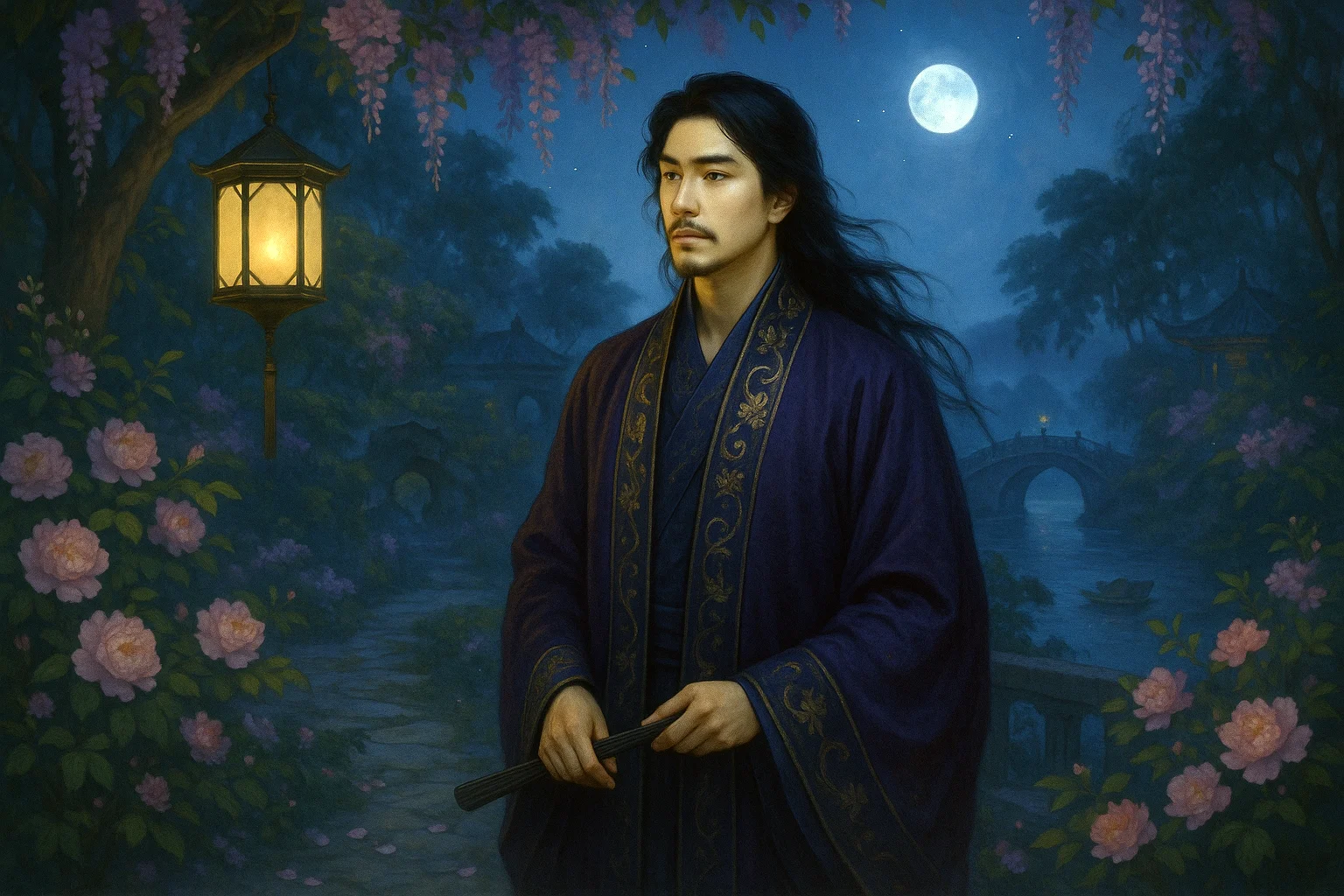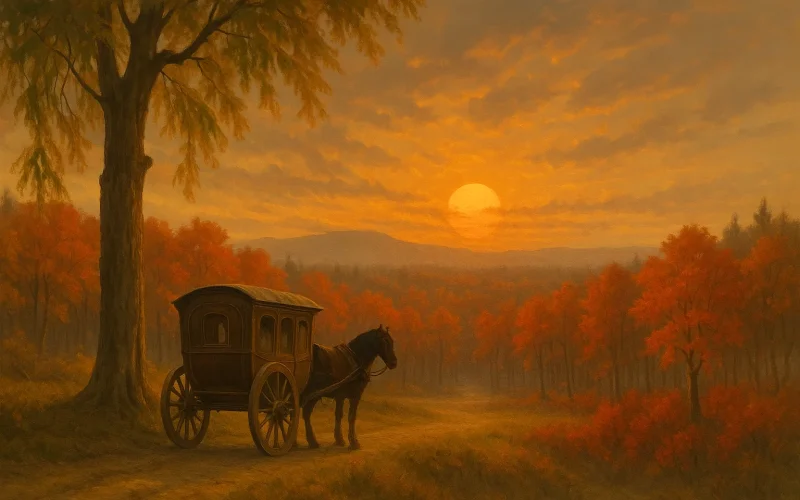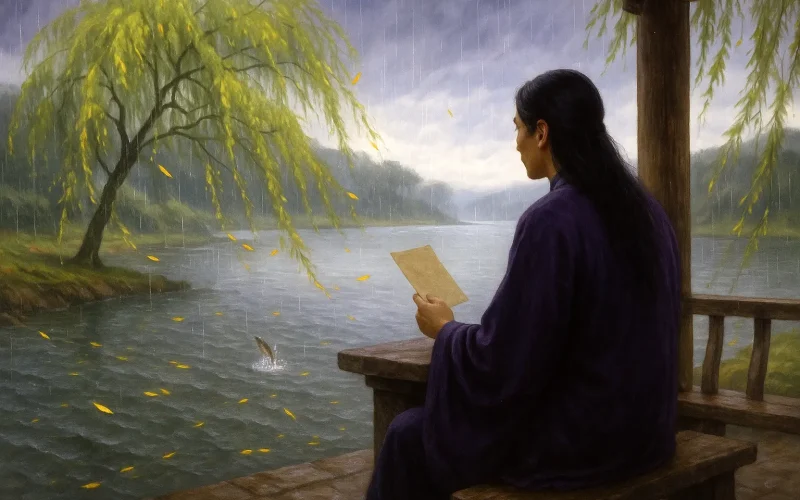You ask when I return? There’s no date set.
Night rain o’er Western hills brims autumn’s pools yet.
When by our window can we trim the wick,
And talk of night rain when our hearts were sick?
Original Poem
「夜雨寄北」
李商隐
君问归期未有期,巴山夜雨涨秋池。
何当共剪西窗烛,却话巴山夜雨时。
Interpretation
This poem was composed in the autumn of 848 AD, when Li Shangyin, having accepted an appointment from Liu Zhongying, the Military Commissioner of Dongchuan, journeyed to Shu (modern Sichuan) to serve as a Secretariat Officer. One of Li Shangyin's most renowned and enduringly popular works, the poem builds a panorama of longing common to all humanity with remarkably sparse language. It is worth noting that the poet's family remained in Chang'an at this time, and the Shu region, famed for its "night rain on the Ba Mountains," provides an authentic geographical and meteorological foundation for the verse. While most traditional commentators believe the poem was sent to his wife, née Wang, close examination of the timeline—Wang had passed away the previous year (847 AD)—suggests the intended recipient of this "message sent north" may be abstract or a figure of memory, rendering the poem even more complex and profound in its superimposition of reality and remembrance.
At this juncture, Li Shangyin stood at another turning point in his political life. With the Niu faction ascendant and the Li faction in decline, the poet, once favored by Li Deyu, had no choice but to leave Chang'an and seek new political shelter amidst the rivers and mountains of Shu. This spatial displacement entailed not merely geographical separation but a redefinition of "center" and "periphery" within the scholar-official's spiritual world. While Lines Sent North on a Rainy Night ostensibly deals with personal affection, it encapsulates the existential loneliness and temporal anxiety commonly experienced by Tang scholars during their itinerant official lives. Its timeless appeal lies precisely in this: elevating the hardship of an individual's official wanderings into a meditation on the spatial and temporal separation shared by all humankind.
First Couplet: 君问归期未有期,巴山夜雨涨秋池。
Jūn wèn guīqī wèi yǒu qī, Bāshān yèyǔ zhǎng qiū chí.
You ask when I shall return—I cannot say. Night rain on Ba Mountains swells the autumn pool's bay.
Explication: The opening establishes temporal-spatial tension through a hypothetical dialogue. Between "You ask" and "I cannot say" lies the predestined lack of autonomy for scholar-officials under the Tang bureaucratic system—the indeterminacy of the return date stems not from unwillingness but from impossibility. The phonetic repetition of the word "when/date" (qi) intensifies the psychological echo between anticipation and disappointment. The line "Night rain on Ba Mountains swells the autumn pool's bay" is a paradigm of Li Shangyin's poetic craft: seven characters contain place (Ba Mountains), time (night), weather (rain), season (autumn), space (pool), and action (swell), yet without a trace of clutter. The word "swells" is especially masterful; it describes both the physical process of water accumulation and, metaphorically, the silent, steady rise of longing with the passage of time. The autumn pool becomes a mirror of the soul—each drop of night rain adds another measure to the depth of longing.
Final Couplet: 何当共剪西窗烛,却话巴山夜雨时。
Hédāng gòng jiǎn xī chuāng zhú, què huà Bāshān yèyǔ shí.
Oh, when shall we, by west window, trim the candle's light, And talk of this time, this night rain on Ba Mountains' height?
Explication: This couplet creates a poetic marvel through the technique of temporal folding. "Oh, when" introduces a future vision, yet the content of that vision is "talk" of the present moment ("this night rain on Ba Mountains"). The poet here accomplishes a circular time structure: present solitude (listening to the rain) will become material for future warmth (talking together), and that future warmth, in turn, illuminates the present solitude. The image of "trimming the candle by the west window" draws from the intimate domestic detail of trimming a wick during a long night conversation. Its quality of warmth and intimacy starkly contrasts with the chilly loneliness of the "night rain on Ba Mountains." Particularly noteworthy is the word "talk of" (que hua)—it implies that in the imagined future reunion, the present pain will have been aestheticized, narrativized, transformed into material that nourishes intimacy. This psychological mechanism of converting present hardship into future narrative resource is one of humanity's fundamental wisdoms for resisting solitude.
Holistic Appreciation
This is a lyrical edifice woven with the threads of rain and founded on the depths of time. In only twenty-eight characters, the poem constructs three layers of time and space: the reality of the Ba Mountains night rain (here and now), the hypothetical question-and-answer about return (there and then), and the imagined shared conversation by the west window (some future time). These three spatiotemporal layers are interconnected through the "night rain" imagery, forming interlocking poetic cycles.
The poem's most exquisite aspect is its philosophical exploration of the "listening-to-rain" experience. In the first couplet, the rain is an objective natural phenomenon (swelling the pool); in the final couplet, it has become a remembered signifier for conversation ("talk of this night rain"). This transformation reveals a fundamental pattern of human experience: we do not fully comprehend the meaning of our experiences while living them; it is only in recollection and articulation that an experience attains its complete form. By preemptively placing his present solitude within a framework of future dialogue, Li Shangyin employs poetic wisdom to counter the desolation of reality—since he must face the night rain alone now, he will make this very rain the precious substance of a future shared conversation.
The temporal consciousness exhibited in the poem is particularly profound. In a linear view of time, the "pain of the present" and the "joy of a future reunion" are separate. But with the line "And talk of this time, this night rain," Li Shangyin allows the future to nourish the present, hope to illuminate hardship. This construction of temporal intertextuality elevates the poem beyond the plaintive tone common to longing-for-absence works, raising it to a poetic integration of human temporal experience. When the poet says "talk of," he is already speaking of the present in the voice of the future; this overlapping of times is precisely the core of the poem's charm.
Artistic Merits
- Psychological Depth Through Question-and-Answer Structure: "You ask when I shall return—I cannot say" appears as casual dialogue but is in reality a multi-layered conversation between self and other, between hope and reality. The questioner is far away, the answerer is in the Ba Mountains, and the answer "I cannot say" will itself be re-asked and re-answered in the future ("talk of"), creating an echo-like emotional resonance.
- The Embodiment of Emotion Through Weather Imagery: The Ba Mountains night rain is not merely backdrop but becomes the lyrical subject itself. The prolonged sound of rain corresponds to the far-reaching nature of longing; the rising pool water corresponds to the accumulation of sorrow; the desolation of autumn air corresponds to the bleakness of mood. Li Shangyin allows natural weather to assume the narrative function of emotional development, granting intangible feeling a perceptible form.
- Subtle Deployment of Temporal and Spatial Terms: "Return date" (a temporal promise), "night" (a temporal segment), "autumn" (a temporal season), "Oh, when" (a temporal question), "talk of" (a temporal look-back)—these temporal words interweave with spatial terms like "Ba Mountains," "west window," and "pool" to construct a three-dimensional coordinate system of emotional time and space.
Insights
This work reveals a form of survival wisdom in human emotion that transcends time and space: transforming present solitude into material for future conversation; sublimating present separation into an occasion for spiritual reunion. In his most solitary moment amidst the Ba Mountains night rain, Li Shangyin does not succumb to despair. Instead, he imagines a future scene of "trimming the candle by the west window" and allows the light of that future scene to retrospectively illuminate the present darkness. The lesson for any individual in any era is this: one way to endure suffering is to narrativize it in advance—to imagine how one will tell the story of the present ordeal in the future.
The poem's handling of time in "And talk of this time, this night rain" demonstrates literature's unique power to resist the tyranny of time. In reality, time flows linearly; the present sound of rain will fade, the water in the autumn pool will recede. But poetry, through language, freezes this instant, granting it eternity within the imagination of "talk of." This reminds us: while humans cannot halt the passage of time, we can, through memory and speech, grant certain moments a weight in the spiritual world that transcends temporality.
Ultimately, what this poem offers is not merely moving sentiment about love, but a paradigm for maintaining mental resilience in adversity. When the reality of "I cannot say" when he will return remains unchangeable, the poet turns to constructing a spiritual "trimming the candle by the west window." This shift from physical space to mental space is characteristic of how classical scholars confronted profound challenges: if the body cannot cross the Ba Mountains, let the spirit soar over the passes; if reunion is impossible now, let the present become the most moving topic during a future reunion. In this sense, the poem is not merely a love letter but a map of the heart, showing how to open infinite possibilities within acknowledged limits.
About the poet

Li Shangyin (李商隐), 813 - 858 AD, was a great poet of the late Tang Dynasty. His poems were on a par with those of Du Mu, and he was known as "Little Li Du". Li Shangyin was a native of Qinyang, Jiaozuo City, Henan Province. When he was a teenager, he lost his father at the age of nine, and was called "Zheshui East and West, half a century of wandering".












